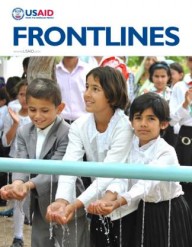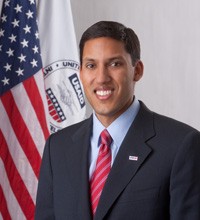This past month, I had the opportunity to travel to Mogadishu, Somalia—the first visit of a senior U.S. Government official to the country in 20 years. For the last few years, the Somali people have endured the unendurable, from endemic conflict to famine. But they have also come together to build a new foundation that will anchor what we hope will be a stable, hopeful future for the nation.
While in Somalia, I saw firsthand our program to empower more than 150,000 youth across the country with the education, skills and training they need to start businesses of their own. In one small village in northern Somalia, this program has helped two young people, Mohamed and Said, set up a small business that produces water pump filters. Their first customer was a mother of three who lived in an internally displaced persons camp and had exhausted her income from buying 12 liters of purified water every day.
Globally, more than 1 billion people do not have access to safe water—a fundamental resource that many of us here in America don’t think twice about when we turn on our tap. While we have seen tremendous progress—halving the proportion of people without sustainable access to safe drinking water since 1990—we still have far to go, and we cannot go alone. We have to leverage the expertise, commitment and resources of a range of partners, from the global private sector to local civil society organizations.
Through our Development Innovation Ventures fund, we’re partnering with the Bill & Melinda Gates Foundation to help bring safe drinking water to at least 4 million of the world’s poor. Called WASH for Life, this initiative will source and rigorously test great ideas to improve access to water and sanitation services. Our first grantee is a startup in Kenya that is using new technology to convert waste into fertilizer and biogas.
We’re also getting ready to release our new water strategy, which will ensure that our work in water, sanitation and hygiene is well-integrated with our efforts in food security, global health and climate change.
The truth is, meeting this challenge is about more than expanding access to clean water and adequate sanitation. It is about eliminating the conditions that put millions of children at significantly heightened risk of contracting painful, debilitating diseases. Every year, neglected tropical diseases—which disproportionately impact poor and rural populations with limited access to clean water and sanitation—affect billions worldwide, undermining the lifelong potential of individuals and their nations.
To help change this reality, we have focused on scaling up our programs in global health to have nationwide impact. In the last several years, Ghana has become the first country in sub-Saharan Africa to eliminate trachoma, the world’s leading cause of preventable blindness. In post-conflict Sierra Leone, we’ve helped achieve national coverage with mass drug administration for all endemic neglected tropical diseases, including in Freetown, one of the most challenging urban environments.
Most importantly, we’ve learned from these approaches. Until recently, many countries were treating these diseases through separate, uncoordinated programs that focused on individuals scattered throughout the country, rather than targeted regions. But thanks to the World Health Organization, mass drug administration proved that there could be a different, much more effective approach.
You can make progress against multiple diseases by controlling and treating them together, and focusing on large, at-risk populations in certain geographic regions. These two themes—integration and focus—have become the hallmark of our new Call to Action to end preventable child death.
Even as we reflect on our progress, we know that there are neglected tropical diseases that need more research, communities that need more support, and individuals who need lifesaving treatment. Ultimately, these programs are about more than fighting a single disease. They’re about advancing human progress—helping families escape devastating cycles of poverty and disease that drain vital health and economic resources, hold back nations, and prevent young children from fulfilling their potential.










Comment
Make a general inquiry or suggest an improvement.